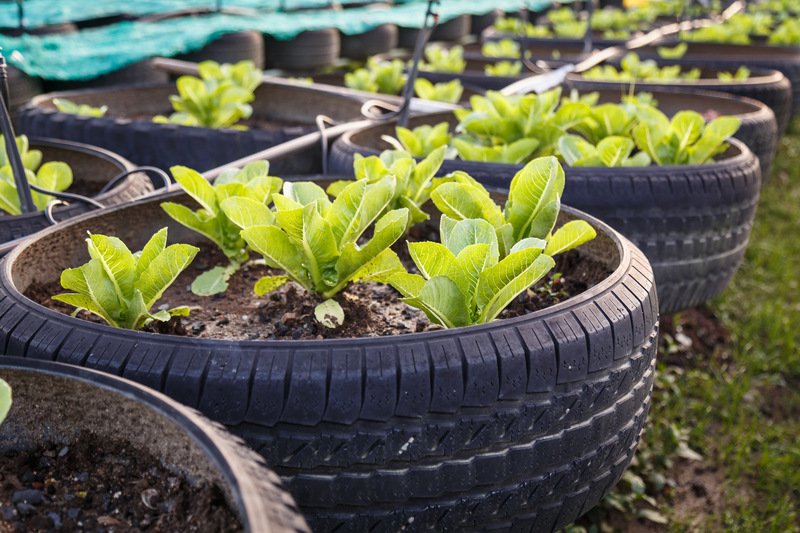Creative Recycling Initiatives for Eco-Friendly Schools
As environmental sustainability takes center stage globally, eco-conscious educational institutions are rapidly embracing creative recycling initiatives to promote greener campuses. This article explores how schools can implement imaginative recycling projects that not only reduce waste but also educate and empower the next generation of environmental stewards. Teachers, administrators, and students alike can become catalysts for change within their communities by adopting and promoting these eco-friendly recycling practices.

Why Recycling Initiatives Matter in Schools
Schools are more than just centers of learning--they are the heart of every community. Approximately 25% to 30% of all solid waste generated in schools consists of materials that can be reused or recycled, according to the Environmental Protection Agency (EPA). Implementing sustainable recycling practices in these environments has a ripple effect that extends to students' homes and wider neighborhoods, ultimately fostering a culture of conservation and responsible resource management.
Environmental and Educational Benefits
- Reduces landfill waste: Schools that recycle divert tons of paper, plastics, and metals from landfills each year.
- Promotes environmental education: Hands-on recycling projects allow students to learn about sustainability, climate change, and the circular economy in a practical way.
- Saves resources and money: Effective recycling can decrease waste management costs and reduce the need for virgin materials.
- Encourages civic responsibility: Participation in recycling programs cultivates a sense of collective responsibility and environmental stewardship among students.
Top Creative Recycling Initiatives for Eco-Friendly Schools
To truly become eco-friendly schools, educational institutions need to move beyond basic recycling bins and introduce innovative, fun, and interactive recycling initiatives. Below are some compelling ideas every school can adapt or be inspired by:
1. Upcycling Art Projects
- Recycled Sculpture Contests: Organize competitions challenging students to build sculptures using only recyclable materials like plastic bottles, tin cans, cardboard boxes, and old newspapers. Award prizes for creativity, size, or conceptual impact!
- Eco-Murals: Encourage students to create artwork using discarded items such as bottle caps, broken tiles, or scraps of fabric to design eye-catching eco-murals that symbolize the school's commitment to recycling.
- Seasonal Decor from Waste: Use old materials to craft festive decorations for events such as Earth Day or school fairs. This not only reduces waste but also sparks community participation and school spirit.
2. Sustainable Classroom Supplies
- Paper Collection Drives: Place collection bins for used paper throughout the school. Have students sort, shred, and then use this paper for art projects or create original handmade recycled paper for cards and assignments.
- Marker and Pen Recycling: Collaborate with brands like Crayola ColorCycle or TerraCycle to recycle used markers and pens. Place clearly labeled drop-off points around campus.
- Recycled Notebooks: Start a program where students bind partially-used notebooks into "Frankenbooks," ensuring every last page is utilized before recycling the rest.
3. Composting Food Waste
- School Compost Clubs: Form student-led clubs to oversee composting efforts, from collecting cafeteria scraps to managing garden bins and monitoring decomposition. The compost can then fertilize school gardens or be offered to local farmers.
- Educational Composting Stations: Install demonstration compost bins and signage around the cafeteria explaining which foods are compostable. Students see firsthand how organic waste transforms into nutrient-rich soil.
4. Uniform and Textbook Recycling Drives
- Uniform Swap Shops: Before each academic year, organize events where families donate gently used uniforms and purchase others at low cost. This encourages reuse and helps reduce overall waste.
- Used Book Fairs: Regularly host book drives collecting old textbooks and reading materials. Have students sort, categorize, and resell or donate them to local organizations in need.
5. Recycling Educational Campaigns
- Peer-Led Green Teams: Empower students to lead "Green Teams" responsible for monitoring recycling bins, spreading awareness, and delivering presentations during assemblies about the impact of recycling.
- Eco-Challenges: Launch schoolwide initiatives such as "Waste-Free Wednesdays" or "Plastic-Free Weeks," recognizing classes or grades that demonstrate the best recycling habits and creativity in reducing single-use plastics.
- Interactive Recycling Games: Develop games or quizzes, such as "Recycling Bingo" or trivia contests, where students earn points for sorting items correctly or identifying recyclable materials.
6. Electronic Waste (E-Waste) Recycling Drives
- Community E-Waste Collection: Host annual or semi-annual e-waste drop-off days, where families can safely dispose of old electronics like computers, phones, and printers for responsible recycling.
- Tech Refurbish Projects: Collaborate with local tech companies or high school clubs to repair salvageable electronics and donate them to charities or underfunded schools.
7. Plastic Free Initiatives
- Reusable Container Campaigns: Encourage the use of reusable water bottles, lunch boxes, and cutlery by launching "Bring Your Own Container" days and offering rewards.
- Ban Single-Use Plastics: Phase out plastic straws, bags, and utensils in cafeterias, replacing them with compostable or reusable alternatives.
How to Successfully Implement Recycling Programs in Schools
Introducing impactful recycling initiatives at your school requires planning, teamwork, and enthusiasm. Here's a step-by-step guide to help administrators and teachers launch sustainable, school-wide recycling programs that last:
Step 1: Assess Your School's Waste Footprint
-
Conduct a Waste Audit:
- Have students and staff sort a typical day's waste into categories--paper, plastic, metals, food waste, electronics, etc.
- Analyze which materials make up the largest proportion and target these for your initial recycling efforts.
Step 2: Set Achievable Goals and Metrics
- Define Objectives: Decide if you'd like to cut total waste, recycle a certain material (like paper or e-waste), or launch a specific project (like an upcycling art contest).
- Track Progress: Set up systems to measure the success of each initiative--bags of paper recycled, compost produced, or e-waste collected.
Step 3: Engage the Whole School Community
- Get Everybody Involved: Recruit students, teachers, maintenance staff, and parents for input and help. Appoint "recycling ambassadors" or eco-warriors from student bodies to drive enthusiasm.
- Communicate Frequently: Use posters, emails, and assemblies to keep everyone updated on goals, successes, and stories of how initiatives benefit the environment.
Step 4: Collaborate with Local Organizations
- Partner with Recycling Companies: Reach out to local recycling centers, composting facilities, waste haulers, and eco-friendly businesses to provide expertise and logistical support.
- Tap Community Resources: Invite speakers from environmental groups to host recycling workshops or field trips.
Step 5: Celebrate Success and Encourage Innovation
- Reward Participation: Recognize classrooms, students, or staff members who go above and beyond in championing recycling with certificates, field trips, or "eco-hero" awards.
- Keep Improving: Encourage feedback and brainstorm sessions so new creative recycling projects are regularly introduced to keep momentum high.
Examples of Successful Creative Recycling in Schools
Many schools across the globe are leading the way in eco-friendly recycling initiatives. Consider these inspiring real-world examples:
- Plastic Bottle Greenhouses: A primary school in the UK built a functioning greenhouse solely out of discarded plastic bottles. This not only educated students about plastic pollution but also became a hands-on gardening and science classroom.
- Terracycle Brigades: Schools in the US register with TerraCycle to collect hard-to-recycle waste like snack wrappers, pens, and toothbrushes, exchanging these for rewards and funding for school activities.
- Compost Cafeterias: Schools in California implemented cafeteria composting streams with "green teams" of students who monitor bins and educate peers, turning hundreds of pounds of lunch waste into valuable compost for campus gardens each month.
- Uniform Exchange Programs: Australian schools run uniform exchanges that save thousands of dollars for families annually and keep clothing out of the landfill.
- Maker Spaces from E-Waste: Innovative tech departments use outdated electronics and discarded materials to create STEM learning spaces filled with repurposed robots, circuit boards, and creative inventions.
Tips for Making Recycling Fun and Lasting
-
Gamify Recycling:
- Create competitions between classes or grades for collecting the most recyclables.
- Design apps or online trackers to visualize progress and encourage participation.
-
Make Education Visual:
- Use colorful posters, infographics, and displays to show the results of recycling efforts.
-
Connect to Global Days:
- Host events on Earth Day, Global Recycling Day, or World Environment Day to reinforce core eco-friendly messages.
-
Empower Student Leadership:
- Let student councils and eco-clubs take the lead in planning, implementing, and promoting new sustainability projects.
-
Bring Parents Aboard:
- Host workshops or family eco-fairs demonstrating creative upcycling ideas and sharing progress toward eco-friendly goals.
Addressing Common Challenges with Recycling Programs
Even the most enthusiastic schools face obstacles in implementing creative recycling initiatives. Common challenges include:
- Contamination of recycling streams: Ensure students understand which items go where through clear signage and regular demonstrations.
- Funding for supplies or bins: Seek sponsorships, grants, or local government support to cover initial costs.
- Lack of student engagement: Integrate recycling themes into classroom lessons, assemblies, and extracurriculars so every student experiences its value firsthand.
- Inconsistent participation: Assign recycling monitors or eco-leaders to regularly check and encourage proper waste disposal schoolwide.

The Lasting Impact of School Recycling Initiatives
Beyond environmental benefits, creative recycling initiatives in eco-friendly schools teach essential life skills such as collaboration, creativity, and civic responsibility. Students develop a respect for resources, learn about the interconnectedness of natural and human systems, and gain a powerful sense of agency in solving real-world problems.
By fostering innovation, teamwork, and environmental stewardship, schools can become true leaders in the global movement for sustainability. A culture of creative recycling nurtures lifelong eco-conscious habits that extend far beyond the classroom walls--building greener schools, stronger communities, and a brighter future for our planet.
Start Your Creative School Recycling Initiative Today!
Embracing creative recycling projects at school doesn't require vast resources--it begins with imagination, commitment, and a willingness to try new ideas. The journey to an eco-friendly school is ongoing, but every recycled bottle, upcycled textbook, or composted lunch counts. Let's empower the next generation to lead the way in sustainable innovation--one school at a time!